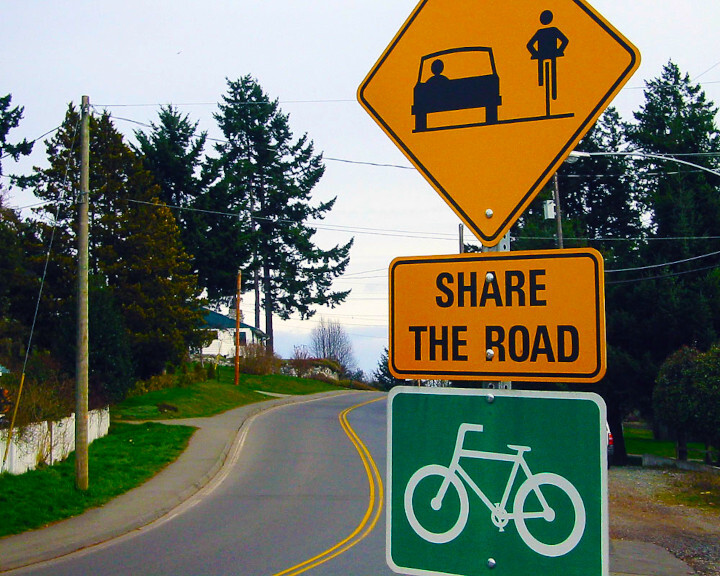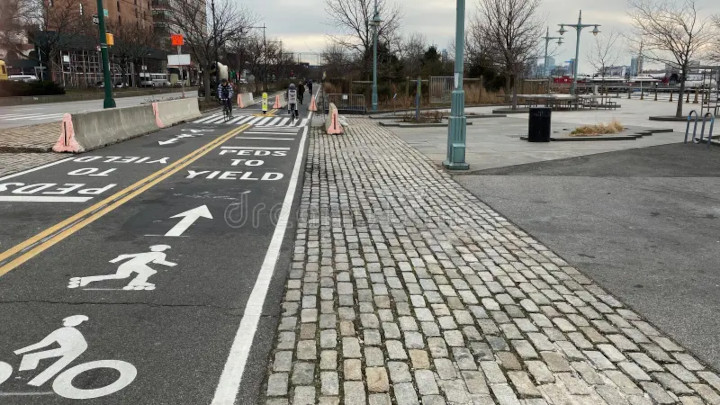Just to be clear - this is not a bicycle-only street, right? I see no-parking and no-stopping signs that only make sense for cars, and car-related arrows painted on the pavement in addition to the bicycle arrows. I see no “cars prohibited” signs nor car-blocking bollards. So is this not just a car street with “painted lines” on it?
This specific section of path also has access for a construction site a bit further up and to the right. However, I have not seen any construction vehicles personally.
In principle it is bicycle only. The round blue sign with the bicycle in it makes it a bicycle path where cars are not allowed. Certain mopeds (ones that go less than 30km/h) are normally allowed, but the sign under the round one bans them as well.
Maybe some car traffic is allowed for e.g. deliveries during certain timeslots (that could be the times under the bicycle sign, but it’s hard to read). I’ve worked in this area when it was under construction and in that time it was also already bicycle only. Google Maps also shows it as such.
The no-stopping sign indeed is odd if it was bicycle only, as afaik this sign doesn’t apply to cyclists. There is also a separate sign indiciating this is a no-parking zone for cyclists (this is the station area, where it is common to only allow bicycle parking in designated areas, such as one of the biggest bicycle parking garages a bit further down this path and then to the left).
The lack of bollards is not odd. This is a common trend seen in other Dutch cities. E.g. Amsterdam has also removed a lot. It makes it safer for cyclists and generally car drivers are welbehaved enough to not use the bicycle paths.
Anyway, definitely not a car street. It’s definitely a bicycle path with maybe some exceptions for cars. Curious to know if someone can take a look at that sign, I unfortunately do not visit Utrecht regularly anymore.
Ok, thank you @[email protected] and @[email protected]! So this is a (mostly)-bicycle-only road because of the round blue sign and car drivers would be expected to know this in this context.
Yes, the sign is all over the Netherlands and many other European countries (I know for sure Germany, France and Belgium). I think it’s part of the Vienna Convention on road signs, which has been adopted by most of Europe and beyond.
Right! Here we only have these green signs, which are purely informational: they indicate the recommended road route for bicycles, but give them no special powers or privileges (by law bicycles are already allowed anywhere they are not prohibited), and definitely do not ban cars on that road.
Even worse are these “share the road” signs, which are also purely informational, but yellow. They somehow manage to both wrongly imply that bicyclists are not allowed to use other roads without these signs, and that sharing the road involves the bicyclist “getting the fuck out of the way” to the side.
Finally this is what my local dedicated bicycle path looks like, after the city finally installed concrete barriers to block it. Before them, car drivers making the turn at the several T-intersections on the boulevard running alongside kept taking their turns too wide (sometimes jumping the curb or sometimes entering through a driveway) and driving on the bike path by mistake as if it were another highway lane.
Damn… Things are quite different here. Although we have these share the road things now as well, called ‘fietsstraat’ aka bicycle street. The idea is that cars are guest and are not allowed to overtake, but in practice it doesn’t feel right when a car is behind you so you make space for them to pass. Often they’ll do it themselves, ignore the no-overtaking rule.
Those traffic signs can be placed for bikes, and paint on a road is not made specifically for cars. With that in mind, the paint is clearly intended for bikes here.
Also, why would you need a “cars prohibited” on a bike road at every visible interval? Why would you need bollards? Are you worried that you’re going to accidentally drive down a bike road? Are the large bikes painted onto the obviously-narrowed lanes not obvious enough?
This is a genuine question. We don’t have the wide angle view on this pic so I can’t tell if this road is part of a wider bike-only network of roads in the city center, a bike-only turn-off from a bigger shared road that car drivers are expected to know not to turn down into, or a shared car/bicycle road.
the no-parking sign is for bikes
Lol.
the paint is clearly intended for bikes here
I’m talking about the painted arrow partially hidden behind the striped shirt guy. Looks like an arrow for cars to me, with the bike box and bike arrows painted in front of it.
Why would you need bollards?
My city has a wonderful grade-separated bike path between a river and a major road. The car drivers at various intersections repeatedly kept taking the turn wrong and driving down this “clearly” bike path, repeatedly killing bicyclists, because the city was refusing to install bollards for some reason. They were saying the “no cars” signs were sufficient. The city only put concrete blocks there after a literal terrorist took a joyride in a van down the bike path for miles, killing dozens.
Just to be clear - this is not a bicycle-only street, right? I see no-parking and no-stopping signs that only make sense for cars, and car-related arrows painted on the pavement in addition to the bicycle arrows. I see no “cars prohibited” signs nor car-blocking bollards. So is this not just a car street with “painted lines” on it?
This specific section of path also has access for a construction site a bit further up and to the right. However, I have not seen any construction vehicles personally.
In principle it is bicycle only. The round blue sign with the bicycle in it makes it a bicycle path where cars are not allowed. Certain mopeds (ones that go less than 30km/h) are normally allowed, but the sign under the round one bans them as well.
Maybe some car traffic is allowed for e.g. deliveries during certain timeslots (that could be the times under the bicycle sign, but it’s hard to read). I’ve worked in this area when it was under construction and in that time it was also already bicycle only. Google Maps also shows it as such.
The no-stopping sign indeed is odd if it was bicycle only, as afaik this sign doesn’t apply to cyclists. There is also a separate sign indiciating this is a no-parking zone for cyclists (this is the station area, where it is common to only allow bicycle parking in designated areas, such as one of the biggest bicycle parking garages a bit further down this path and then to the left).
The lack of bollards is not odd. This is a common trend seen in other Dutch cities. E.g. Amsterdam has also removed a lot. It makes it safer for cyclists and generally car drivers are welbehaved enough to not use the bicycle paths.
Anyway, definitely not a car street. It’s definitely a bicycle path with maybe some exceptions for cars. Curious to know if someone can take a look at that sign, I unfortunately do not visit Utrecht regularly anymore.
Ok, thank you @[email protected] and @[email protected]! So this is a (mostly)-bicycle-only road because of the round blue sign and car drivers would be expected to know this in this context.
Yes, the sign is all over the Netherlands and many other European countries (I know for sure Germany, France and Belgium). I think it’s part of the Vienna Convention on road signs, which has been adopted by most of Europe and beyond.
Right! Here we only have these green signs, which are purely informational: they indicate the recommended road route for bicycles, but give them no special powers or privileges (by law bicycles are already allowed anywhere they are not prohibited), and definitely do not ban cars on that road.



Even worse are these “share the road” signs, which are also purely informational, but yellow. They somehow manage to both wrongly imply that bicyclists are not allowed to use other roads without these signs, and that sharing the road involves the bicyclist “getting the fuck out of the way” to the side.
Finally this is what my local dedicated bicycle path looks like, after the city finally installed concrete barriers to block it. Before them, car drivers making the turn at the several T-intersections on the boulevard running alongside kept taking their turns too wide (sometimes jumping the curb or sometimes entering through a driveway) and driving on the bike path by mistake as if it were another highway lane.
Damn… Things are quite different here. Although we have these share the road things now as well, called ‘fietsstraat’ aka bicycle street. The idea is that cars are guest and are not allowed to overtake, but in practice it doesn’t feel right when a car is behind you so you make space for them to pass. Often they’ll do it themselves, ignore the no-overtaking rule.
Those traffic signs can be placed for bikes, and paint on a road is not made specifically for cars. With that in mind, the paint is clearly intended for bikes here.
Also, why would you need a “cars prohibited” on a bike road at every visible interval? Why would you need bollards? Are you worried that you’re going to accidentally drive down a bike road? Are the large bikes painted onto the obviously-narrowed lanes not obvious enough?
A seriously weird comment.
This is a genuine question. We don’t have the wide angle view on this pic so I can’t tell if this road is part of a wider bike-only network of roads in the city center, a bike-only turn-off from a bigger shared road that car drivers are expected to know not to turn down into, or a shared car/bicycle road.
Lol.
I’m talking about the painted arrow partially hidden behind the striped shirt guy. Looks like an arrow for cars to me, with the bike box and bike arrows painted in front of it.
My city has a wonderful grade-separated bike path between a river and a major road. The car drivers at various intersections repeatedly kept taking the turn wrong and driving down this “clearly” bike path, repeatedly killing bicyclists, because the city was refusing to install bollards for some reason. They were saying the “no cars” signs were sufficient. The city only put concrete blocks there after a literal terrorist took a joyride in a van down the bike path for miles, killing dozens.
This appears to be a bicycle-only street in Utrecht, Netherlands.
Here is an alternative image I’ve found: